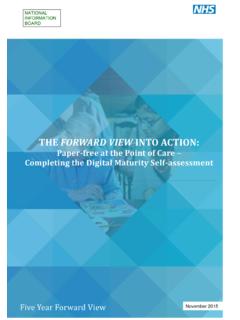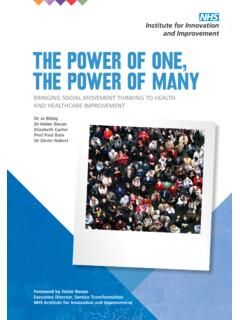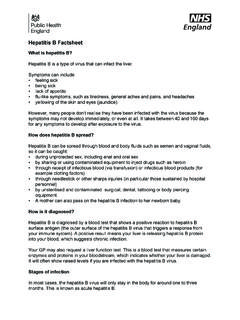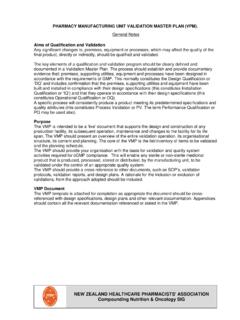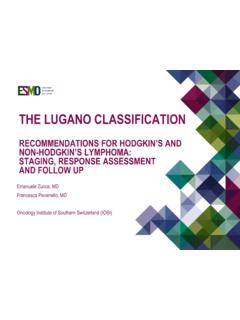Transcription of ENHANCED SUPORTIVE CARE - NHS England
1 ENHANCED SUPPORTIVE CAREI ntegrating supportive care in oncology (Phase I: Treatment with palliative intent)ESC is a new initiative aimed at addressing more fully the needs of patients on active anti-cancer treatment in the context of a cancer proposal has been developed from a local pilot lead by The Christie NHS Foundation Supportive Care Integrating supportive care in oncology Supportive care in cancer is the prevention and management of the adverse effects of cancer and its treatment. This includes management of physical and psychological symptoms and side effects across the continuum of the cancer experience from diagnosis, through anticancer treatment, to post-treatment care. Enhancing rehabilitation, secondary cancer prevention, survivorship and end of life care are all integral to Supportive Care. (Multinational Association of Supportive Care in Cancer (MASCC) 2015 ). Palliative Care is currently defined, by the World Health Organisation, as an approach that improves the quality of life of patients and their families facing the problems associated with life-threatening illness, through the prevention and relief of suffering by means of early identification and impeccable assessment and treatment of pain and other problems, physical, psychosocial and OPPORTUNITY AND UNMET NEED4 ENHANCED Supportive Care Integrating supportive care in oncology ENHANCED supportive care has developed through recognition of what specialist palliative care can offer, but also from recognition of the barriers to achieving earlier involvement of palliative care expertise within the cancer treatment continuum.
2 These barriers may be largely due to the perception of palliative care by the public, patients and many health professionals - in particular the association with care at the end of life. The excellent care that is provided for patients who are nearing the end of life, needs to be extended to support them much earlier on in the pathway. The landscape of cancer care is changing rapidly. Due to advances in cancer treatment, there are now an increasing number of patients, at different stages of their illness, who are living with cancer (Living with and Beyond Cancer Taking Action to Improve Outcome: DH 2010). They may be actively receiving anti-cancer therapies (sometimes over many years), or be off treatment either in remission, cured ( beyond cancer ), or living with advancing disease. Many of these patients - especially those with advanced progressing cancer - will require the help of healthcare professionals who have expertise in managing a range of problems, whether these are associated with the cancer itself, or as a consequence of cancer treatment.
3 There is mounting evidence that good supportive care provided early can improve quality of life in these patients, possibly lengthening their survival and reducing the need for aggressive treatments near the end of their lives. (Temel et al 2010; Bakitas 2015).5 ENHANCED Supportive Care Integrating supportive care in oncology Optimising the use of chemotherapy in advanced incurable disease: Patients with advanced disease who progress through several lines of chemotherapy treatment eventually reach a point where there may be little or no benefit. While it is important that such patients have opportunity to access any treatment where there is a reasonable chance of benefit, it is also important that treatment does not become a significant burden during their very last weeks or even days of life. Early integration of supportive/palliative care has also been shown to optimize the timing of final chemotherapy administration (with a longer interval between last dose of chemotherapy and death)(Greer 2012).
4 Early integration of supportive/palliative care into cancer care may therefore benefit patients with advanced progressing disease, and promote better care in the last days of life. ESC can support teams/patient when making decisions on stopping oncological treatments and help the transition to best supportive care. ESC creates opportunities for earlier conversations and planning care (Greer 2012).6 ENHANCED Supportive Care Integrating supportive care in oncology ENHANCED supportive care (ESC), developed by The Christie NHS Foundation Trust, has rebranded and re-packaged existing palliative care services that support cancer patients, to better suit the changing landscape of cancer care. The approach and branding to ESC has overcome the automatic association with terminal illness / loss of hope. Furthermore, it has demonstrated improvements in patient experience, increased referrals to supportive care services and potential cost efficiencies.
5 Integration of palliative care services with oncology practice. What s in a name? Dalal S et al, MD Anderson cancer centre (poster presentation, MASCC Copenhagen, 2015). ESC can be applied throughout the whole continuum of cancer care. The idea is to introduce ESC in a phased way, starting with those patients who are diagnosed with incurable cancer. Subsequently, ESC should be made available to those patients living with curable cancer, or living with cancer as a chronic illness, as well as cancer survivors. Throughout this document the term supportive care is being used to encompass a range of expertise that includes palliative care alongside pain medicine, interventional radiology, complimentary therapy, psycho- oncology and spiritual care as well as access to physiotherapy, dietetics and occupational : This guidance applies to patients who are treated within cancer SUPPORTIVE CARE THE MODEL8 ENHANCED Supportive Care Integrating supportive care in oncologyEarlier involvement of supportive care care teams that work more positive approach to supportive edge and evidence-based practice in supportive and palliative to improve practice in chemotherapy care.
6 6 PRINCIPLES OF Supportive Care Integrating supportive care in oncologyKey practical steps:1. Appoint a clinical lead for supportive Establish a supportive care team within each cancer Ensure offer of referral at the point of incurable Increased joint working in clinics. 5. Systems to ensure availability of prompt phone and face to face advice. 6. A weekly supportive care MDT out-patient clinic. 7. Automatic referral trigger for patients on high doses of Supportive Care Integrating supportive care in oncologyAim: From the point of recognition of incurable disease (whether local or metastatic) all patients should be screened for supportive care needs (NICE 2004). This should include prompt identification and management of physical and psychological symptoms. This has the potential to improve the patient experience and their ability to tolerate anti-cancer treatment. 1 EARLIER INVOLVEMENT OF SUPPORTIVE CARE SERVICES11 ENHANCED Supportive Care Integrating supportive care in oncologyPractical steps:Closer working with oncologyGreater integration between oncology and supportive care teams: Joint working in targeted clinics and on ward rounds: This interface is most effective within disease groups where there is a high need for supportive care.
7 It is in these groups that the principles of ESC have made the biggest impact. Patients are identified proactively rather than reactively, with teams actively seeking out appropriate patients. This reduces professional barriers to referral and makes ESC part of the cancer pathway. An identified clinical lead that would bring this group of people together and help shape the organisation, working with supportive care teams, cancer specialists and patient participation groups. Joint educational events, case discussions and access to supportive care Providing efficient referral pathways to allow prompt access to supportive care expertise and advice, making it easy by having on-call team members for in-patient and out-patient referrals. Supportive care teams being available to provide advice to oncology , by phone and face to face. Patients having access to an advice line for issues relating to pain / symptom control / complications of Supportive Care Integrating supportive care in oncologyMonitoring measures.
8 OutcomeToolFrequencyReduction in the number of patients who die within 30 days of their last chemotherapy treatmentSACT DatabaseMonthly report compared with previous 12month figuresReduction in the number of patients in whom treatment is curtailed after 1 or2 cycles of a new line of chemotherapySACT DatabaseMonthly figures compared with previous 12month figuresImproved Patient ExperienceQuestionnaire based on Christie CQUINB aseline and 6/12ly intervalsImproved Carer reported experienceInterview based on Christie CQUINB aseline and 6/12ly intervalReduced Hospital admission rate per disease groupLocal trust processesBaseline and annual figureReduced Length of hospital stay Local trust processesBaseline and annual figuresIncreased Evidence patients offered referral to SCT at point of metastatic diagnosisAudit of monthly deaths per disease groupBaseline and quarterly report 13 ENHANCED Supportive Care Integrating supportive care in oncologyAim: Cancer patients should have access to a comprehensive range of support services, which run alongside their anti-cancer treatments.
9 These supportive care services should work together, ideally under one umbrella, and have recognition in their centres as a core part of the business being regarded as the 4th pillar of cancer care . 2 SUPPORTIVE CARE TEAMS THAT WORK TOGETHER14 ENHANCED Supportive Care Integrating supportive care in oncologyPractical steps:Establishing who should be involved in delivering supportive careSupportive care services in cancer should include a range of expertise from specialist palliative care, pain medicine, interventional radiology, complementary therapy, psycho- oncology and spiritual care, as well as access to physiotherapy, dietetics and occupational therapy. These teams should consider working within one division, to promote a joined up approach and to maintain a high profile within remit of supportive careSupportive care teams should recognise the changing landscape of cancer care and be prepared, now in and the future, to deliver care across the whole continuum including,1.
10 Living with cancer: Supportive care during anti-cancer Living with cancer: Palliative and end of life Living beyond cancer. 15 ENHANCED Supportive Care Integrating supportive care in oncologyMonitoring measures:OutcomeToolFrequencyImproved Patient ExperienceQuestionnaire based on Christie CQUINB aseline and 6/12ly intervalsImproved Carer reported experienceInterview based on Christie CQUINB aseline and 6/12ly intervalIncreased Evidence patients are offered referral to SCT at point of metastatic diagnosisAudit of monthly deaths per disease groupBaseline and quarterly report Internal processes for supportive care teams Hold a weekly MDT to discuss complex patients. Define clear channels of communication between supportive care professionals to enable prompt referral and response. Joint working on projects research and audit to enhance clinical outcomes and care. Provision of one-stop supportive care outpatient clinics with multiple supportive care specialties available within the clinic to help patients (eg palliative care, pain, complementary, OT, physiotherapy).






